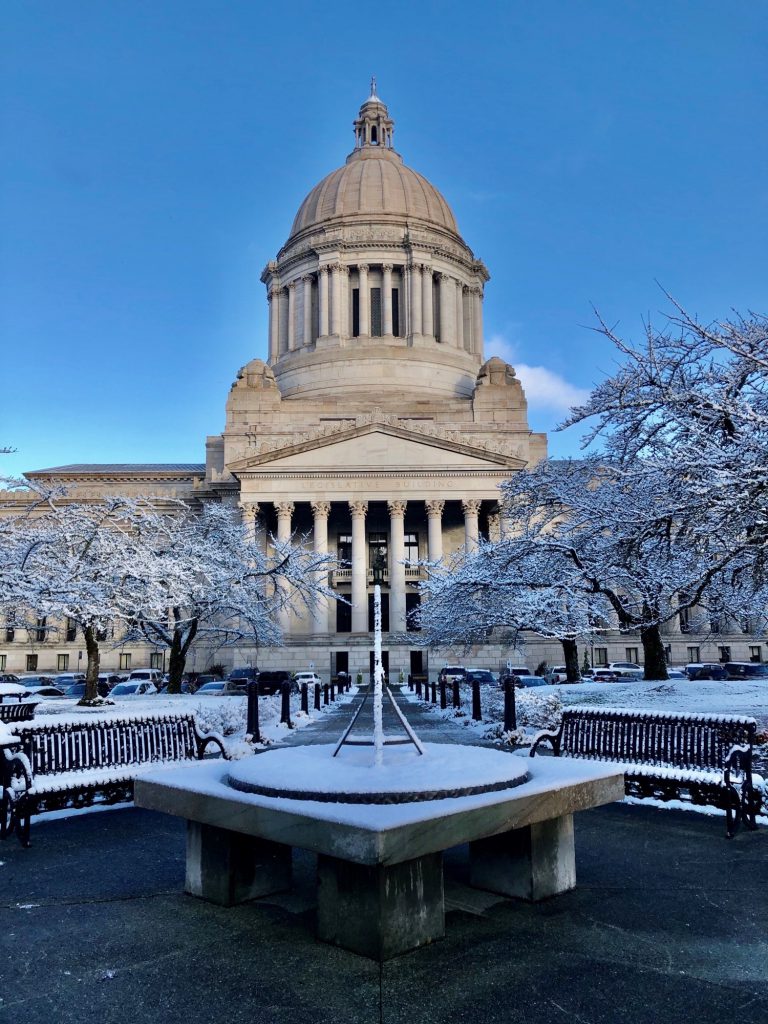February 12, 2021
NFIB Washington Legislative Update | Week 5
State Director Patrick Connor reports from Olympia on the legislative and political week ending February 12.
With Monday’s (February 15) deadline for bills to pass policy committees looming, there were fewer public hearings and more executive sessions in committees this week. A number of bills NFIB is watching advanced to either rules or a fiscal committee.
Unless a policy bill is deemed “necessary to implement the budget” (NTIB), it will be considered dead for the session if it fails to advance from a policy committee by Monday. Bills with a tax or spending element sent to a fiscal committee (House Appropriations, House Capital Budget, House Finance, Senate Ways & Means, and House or Senate Transportation) have until the following Monday, February 22, to advance from those committees.
Small business scored an important victory Wednesday when the state Senate unanimously passed HB 1095, exempting PPP forgivable loan proceeds, EIDL advances, state Working Washington Small Business Grants, and other COVID-related government assistance from the state’s B&O and public utility taxes. The House unanimously passed the bill January 22. It is headed to Gov. Jay Inslee’s desk for signature. This was a priority bill for NFIB.
#OpenSafeOpenNow
NFIB’s top legislative priority is getting our state’s small businesses re-opened as quickly and safely as possible.
While SB 5114 faces certain death, bottled up in Sen. Sam Hunt’s State Government & Elections Committee, Governor Inslee seems to have bowed to growing pressure to re-open the state. Yesterday (Thursday) the governor announced that, effective Sunday, February 14, four of five regions of the state will advance or remain in Phase 2, allowing restaurants to open at 25% capacity just in time for Valentine’s Day.
The south central region, which includes Benton, Columbia, Franklin, Kittitas, Walla Walla, and Yakima counties, remains in Phase 1.
The governor has yet to release any information about what Phase 3 may look like.
Environment
- HB 1091 – Governor Inslee’s low carbon fuel standard (LCFS) has passed the House Environment & Energy and Appropriations committees. Strangely, when Appropriations approved the bill, it was sent to House Transportation rather than Rules. House Transportation will hold a public hearing at 1:30 p.m., Tuesday, February 16 – the bill’s third public hearing so far. Click here, select “House Transportation” and “2/16/2021 1:30 PM,” then click the circle next to “2SHB 1091 Transportation fuel/carbon” to sign-in “con” or testify against the bill. NFIB opposes HB 1091.
- SB 5126 – the governor’s cap-and-trade or “cap-and-invest” proposal was heard back on January 19, but has not passed out of the Senate Energy, Environment & Technology Committee. While it could be considered “dead,” it is more likely to be deemed “NTIB,” and could move later in the session. NFIB opposes the bill.
Health Care
- SB 5149 – Governor Inslee’s plan to add a nearly $40 tax per year to each health insurance policy sold in the state, in order to increase funding for public health, was amended today (Friday) in the Senate Health & Long-Term Care Committee. The fee would be phased-in over five years. Beginning in 2022, the monthly tax would be $1.54, capped at $100 million. By 2026, the monthly tax would increase to $3.07, capped at $200 million. The bill heads to Senate Ways & Means for further consideration. NFIB opposes the bill.
- SB 5377 – Cascade Care 2.0 also advanced today (Friday) from the Senate Health & Long-Term Care Committee. The bill seeks to expand “public option” health plans to more counties by requiring large hospital systems to participate. The bill would also establish a subsidy framework to assist individuals and families with incomes up to 500% of the federal poverty level who are buying health insurance in the individual market. A funding mechanism is not included in the bill. Finally, the bill would limit the number and types of health insurance plans carriers could offer in each metal tier, to better ensure meaningful differences among plans offered. Several concerns NFIB raised with advocates were addressed in the amendment. NFIB continues to monitor this bill.
Labor
- HB 1455 – NFIB signed in supporting this bill to prohibit the Employment Security Department and Department of Labor & Industries from disclosing workers’ full Social Security Numbers (SSN) on correspondence to employers, unless required under federal law. Last year’s fraudulent unemployment claims scandal was one recent example where materials sent to employers included workers’ full SSN. Some of those letters were sent to businesses that had never employed the individual(s). Moreover, if employers are required to maintain paper or electronic copies of this type of correspondence with full SSNs, the possibility of data breaches and identity theft increases, potentially placing liability on the small employer. Partial SSNs should be sufficient to identify workers in agency correspondence. NFIB supports the bill, which is scheduled for executive action Monday in the House Labor & Workplace Standards Committee.
- HB 1474 – This bill would expand unemployment audits and increase penalties. NFIB is concerned about wording in the bill removing the requirement that violations be willful for a penalty to be assessed. NFIB opposes the bill unless amended. It is scheduled for executive action Monday in the House Labor & Workplace Standards Committee.
- SB 5197 – To further address skyrocketing unemployment tax rates, this legislation would change the formula for increasing the taxable wage base, tying it to the Consumer Price Index and capping annual increases at 3%. Currently, the formula uses the state average wage, which has increased 5-7% per year for the past several years. The bill was heard this week in the Senate Labor, Commerce & Tribal Affairs Committee, but has not yet been scheduled for executive action. NFIB supports the bill.
Regulatory
- HB 1400, 1401, 1402, and 1403 – NFIB testified Monday in support of this package of bills on occupational licensing. Taken together, the bills would provide the state Department of Licensing some flexibility in granting licenses to individuals able to demonstrate proficiency in ways other than traditional examinations, expedite licensing for individuals already certified in states with requirements substantially equivalent to Washington’s, require prospective review of proposed new licensing standards to ensure licensing is necessary, and have the department review existing licensing processes and requirements every five years. NFIB supports the bills.
Tax & Fiscal
- HB 1465 – NFIB testified about its concerns with this bill seeking to increase the estate tax on almost all decedents. In addition to raising the tax rate for most estates, the bill would create a tax preference for family-owned newspapers. If passed, the Cowles, Blethen, and Bezos families, among a few others, would enjoy a $5 million exclusion, while all other family-owned small businesses would still be capped at a $2.5 million exclusion. NFIB also submitted written comments to the sponsor, who has graciously agreed to meet with us Monday to discuss alternative approaches to better protect family-owned small businesses from the tax. NFIB opposes the bill in its present form.
- HB 1496 – NFIB also submitted written comments seeking clarification and raising some concerns about this capital gains tax proposal. It appears the bill intends to exempt most family-owned small businesses, those having 50 or fewer employees and revenues of $10 million or less during the year proceeding the sale of the business, from the tax. However, references to sole proprietorships alone in the deduction language led us to question whether the bill would, in fact, exclude all small businesses organized as pass-through and disregarded entities for federal income tax purposes. We are awaiting a response, and are opposed to the bill unless all small businesses meeting the 50 employee, $10 million threshold are exempt.
Previous Reports and Related News
- January 23—Week 2: Legislative Report. House passes NFIB-backed B&O tax exemption for PPP, EIDL loans
- January 15–Week 1: Legislative Report. Senate Bill Would Stop the State from Following the “Roadmap to Ruin”
NFIB is a member-driven organization advocating on behalf of small and independent businesses nationwide.
Related Articles















